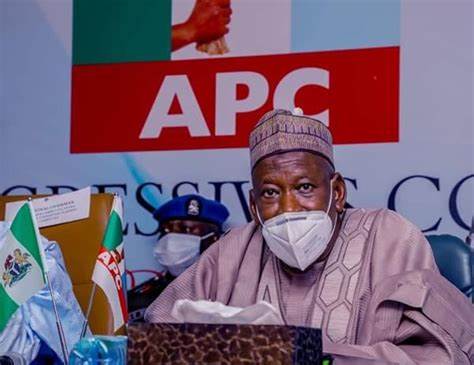Abdullahi Ganduje has stepped down as National Chairman of the All Progressives Congress, ending his tenure as leader of Nigeria’s ruling party amid mounting internal pressures and regional political agitations.
Party sources confirmed that Ganduje submitted his resignation on Friday, June 27, 2025, though the specific reasons for his departure were not immediately disclosed. The former Kano State Governor will be temporarily replaced by a National Vice Chairman until the party holds its scheduled convention in December.
According to insider sources, Ganduje’s resignation stems from intensifying pressure from North Central stakeholders who have been demanding the return of the chairmanship position to their region. The agitation has created significant internal tension within the party structure, with various regional blocs pushing for better representation in key leadership positions.
Since assuming office in August 2023 following Abdullahi Adamu’s resignation, Ganduje has faced persistent opposition from party stakeholders who argued that the North Central region deserved to reclaim the position. This regional power struggle has contributed to the growing internal discord that ultimately led to his decision to step down.
The resignation comes at a particularly sensitive time for the APC, as the party grapples with multiple internal crises that threaten its unity ahead of future electoral cycles. Sources within the party reveal that beyond regional agitations, there are deeper factional disputes involving key party figures and their political ambitions.
One of the most significant internal challenges facing the APC relates to speculation and controversy surrounding Vice President Kashim Shettima’s political future. Party insiders suggest that discussions about potential changes to the 2027 ticket, including possible moves to replace Shettima, have created additional tensions within the party hierarchy and contributed to the overall atmosphere of uncertainty.
These internal machinations have reportedly created camps within the party, with different factions positioning themselves for advantage in future political arrangements. The speculation about Shettima’s role in 2027 has particularly unsettled northern stakeholders who view any such moves as potentially destabilizing to regional political interests.
Ganduje’s departure represents a significant development in APC’s internal dynamics, coming as the party seeks to maintain cohesion while managing competing regional and factional interests. The December convention will now serve as a crucial platform for addressing these internal challenges and determining the party’s leadership structure moving forward.
The resignation also highlights the ongoing struggle within the APC to balance regional representation and manage the various power blocs that emerged following President Tinubu’s electoral victory. Party leaders will now face the challenge of selecting interim leadership that can navigate these complex internal dynamics while maintaining party unity.

















